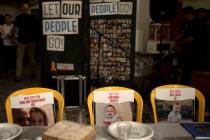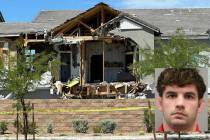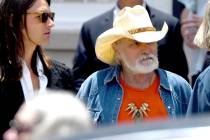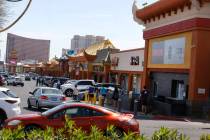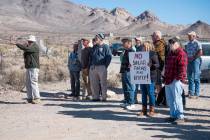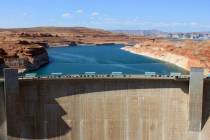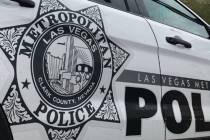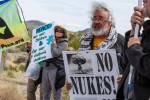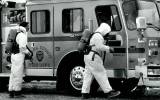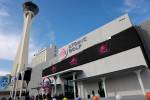State officials urge halt to federal Yucca rail line review
With few exceptions, most speakers Thursday told the Surface Transportation Board to suspend its review of federal plans to build a rail line from Caliente for hauling nuclear waste to a proposed repository at Yucca Mountain.
The three-member panel chaired by Charles Nottingham is considering a Department of Energy request for a certificate the agency needs to proceed toward building a $2.6 billion rail line primarily for shipping the nation's spent nuclear fuel on its last leg to the mountain disposal site. The 319-mile rail corridor would stretch from Caliente across remote terrain rich in American Indian cultural sites and some ranching operations that date back to the late 1800s.
Despite the rural aspect of the rail line proposal, state and local officials warned that rail shipments of potentially deadly nuclear waste would still roll through populated areas of the Las Vegas Valley if the board approves the certificate and the Nuclear Regulatory Commission, following a lengthy review, grants DOE licenses to build and operate a repository, 100 miles northwest of Las Vegas.
Las Vegas Mayor Oscar Goodman said allowing shipments of nuclear waste on the planned rail line won't eliminate routing through the heart of the city too close to casinos and resorts that drive tourism.
Should an accident happen, "Las Vegas would virtually become a ghost town overnight," Goodman said.
City attorney Brad Jerbic said since DOE has put almost total reliance on untested, undeveloped casks for containing deadly radioactive waste, instead of relying on the mountain's geology, then the government should leave the spent nuclear fuel where it is at commercial power reactor sites.
"Why the heck are you moving this stuff in the first place?" Jerbic said. "If it's not about the mountain anymore and it's all about the casks, then why the heck are we doing this?"
Clark County Commissioner Susan Brager noted that the county, like other entities, would be faced with an unfunded mandate to provide for first responders and the public's safety in the event of an accident.
After his testimony, Goodman said he thought the Surface Transportation Board would take his comments seriously and not fall on deaf ears like past remarks he's made to hearing panels tied to the Department of Energy and nuclear regulators.
"I think we're on a level playing field here," he said.
Robert Halstead, transportation adviser for the state Nuclear Projects Agency, said DOE's plans for the rail line fails to adequately address terrorism risks, sabotage and environmental concerns.
Halstead emphasized the nationwide impacts of the plan from using rail routes to reach Caliente that would have to cross 44 states, the District of Columbia and 33 American Indian nations.
Halstead's analysis shows the proposed rail option would affect some 22,000 miles of track in 836 counties where 138 million people live.
"Every rails cask would contain 100 times the dangerous radioactive cesium and strontium released by the Hiroshima bomb," he said.
Rep. Shelley Berkley, D-Nev., reminded the board of the changing political climate with the election of Barack Obama that puts a damper on the Yucca Mountain Project.
"The nuclear industry and the Bush administration can continue to deny reality and act as if nothing changed on November 4th. But we now have a president-elect who has said there will be no Yucca Mountain when he is in the White House," she said. "So why are we still discussing plans for a 300-mile-long, $3 billion gold-plated railroad to nowhere that ends at a hole in the Nevada desert that will never become home to this nation's nuclear waste?"
Phil Swain, chairman of the 350-member Moapa Band of Paiutes said critical issues that must be weighed are American Indian burial sites, "astronomical costs" and water for construction.
"It's just not a Nevada issue. It comes across the United States across miles and miles of native American lands," Swain said.
Mary Neumayr, DOE deputy general counsel for environment and nuclear programs, said spent fuel rods encased in heavily shielded casks can be transported safely and is "thousands of times more safe than (transporting) other hazardous materials. ... It's been done for many decades now. It's been done safely and securely," she said.
A Caliente rail line also wouldn't harm any existing rail operations in the country, Neumayr noted.
Paul Seidler, senior director in Nevada for the Nuclear Energy Institute, said DOE's plan satisfies the board's requirements for approval. He pointed out that DOE has good track record for safe delivery of transuranic waste to a geologic disposal site in New Mexico.
Contact reporter Keith Rogers at krogers@reviewjournal.com or 702-383-0308.








